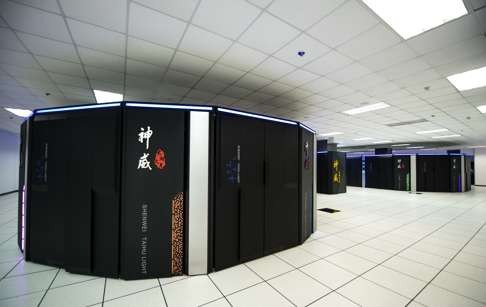- Sep 17, 2013
- 1,492
China has started to develop its first exascale computer capable of performing a billion billion calculations per second, as the country steps up efforts to stay in the lead of the global supercomputer race.
The high-performance computer, if it can be built by 2020, will boost the country’s scientific capability and possibly maintain its prestige of housing the world’s fastest calculating system.
The exascale supercomputer will operate at 1,000 petaflops, or quadrillion calculations per second, 10 times the speed of China’s TaihuLight, which topped a 2016 global supercomputer speed list.
With an official goal to put an exascale computer into service in five years, the Ministry of Science and Technology recently funded three research institutions to develop prototypes, Xinhua said.
When these are completed, the ministry will pick two teams with the best designs to build the fully-functioning exascale supercomputer, said An Hong, a computer scientist at the University of Science and Technology of China.
An, who has been training Chinese researchers to use supercomputers, said existing machines still failed to provide the speeds required to study new materials, develop drugs and design nuclear power plants.

“The demand in computing speed has no limits,” An said. “Now we have the money and technology, we can build better computers for scientists to use.”
The top tech enterprise Sugon, which built the Dawning supercomputers, was the first to kick off the exascale computer project, Xinhua reported.
The National University of Defence Technology, which is under the direct leadership of the Central Military Commission, joined the competition in October, aiming to finish the prototype by early 2018. The military academy developed the former world champion Tianhe-2 supercomputer.
This week, the National Research Centre of Parallel Computer Engineering and Technology, which developed TaihuLight, started work on its new machine.
This year, China displaced the US for the first time as the country with the most supercomputers in TOP500. China had 167 systems to the Americans’ 165.
Japan and France are also aiming to develop exascale systems by 2020, while the US will have its own by 2023.
The high-performance computer, if it can be built by 2020, will boost the country’s scientific capability and possibly maintain its prestige of housing the world’s fastest calculating system.
The exascale supercomputer will operate at 1,000 petaflops, or quadrillion calculations per second, 10 times the speed of China’s TaihuLight, which topped a 2016 global supercomputer speed list.
With an official goal to put an exascale computer into service in five years, the Ministry of Science and Technology recently funded three research institutions to develop prototypes, Xinhua said.
When these are completed, the ministry will pick two teams with the best designs to build the fully-functioning exascale supercomputer, said An Hong, a computer scientist at the University of Science and Technology of China.
An, who has been training Chinese researchers to use supercomputers, said existing machines still failed to provide the speeds required to study new materials, develop drugs and design nuclear power plants.
“The demand in computing speed has no limits,” An said. “Now we have the money and technology, we can build better computers for scientists to use.”
The top tech enterprise Sugon, which built the Dawning supercomputers, was the first to kick off the exascale computer project, Xinhua reported.
The National University of Defence Technology, which is under the direct leadership of the Central Military Commission, joined the competition in October, aiming to finish the prototype by early 2018. The military academy developed the former world champion Tianhe-2 supercomputer.
This week, the National Research Centre of Parallel Computer Engineering and Technology, which developed TaihuLight, started work on its new machine.
This year, China displaced the US for the first time as the country with the most supercomputers in TOP500. China had 167 systems to the Americans’ 165.
Japan and France are also aiming to develop exascale systems by 2020, while the US will have its own by 2023.

